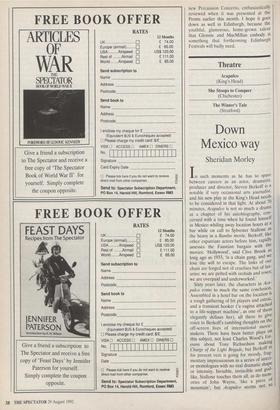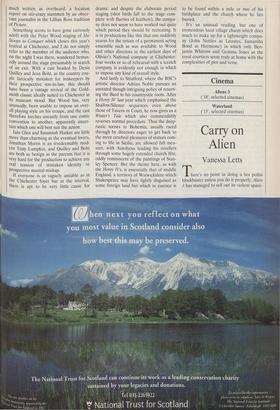Theatre
Acapulco (King's Head) She Stoops to Conquer (Chichester) The Winter's Tale (Stratford)
Down Mexico way
Sheridan Morley
In such moments as he has to spare between careers as an actor, dramatist, producer and director, Steven Berkoff is a notable if very occasional arts journalist, and his new play at the King's Head needs to be considered in that light. At about 70 minutes, Acapulco is not so much a drama as a chapter of his autobiography, con- cerned with a time when he found himself in Mexico whiling away location hours at a bar while on call to Sylvester Stallone as the heavy in a Rambo movie. Berkoff, like other expatriate actors before him, rapidly assesses the Faustian bargain with the movies: 'Hollywood', said Clive Brook as long ago as 1933, 'is a chain gang, and we lose the will to escape. The links of our chain are forged not of cruelties but of lux- uries: we are pelted with orchids and roses; we are overpaid and underworked.' Sixty years later, the characters in Aca- pulco come to much the same conclusion. Assembled in a hotel bar on the location is a rough gathering of bit players and extras, and a transient hooker Ca vagina attached to a life-support machine', as one of them elegantly defines her), all there to give voice to Berkoff's rambling thoughts on the off-screen lives of international movie- makers. There have been better plays on this subject, not least Charles Wood's Vet- erans about Tony Richardson making Charge of the Light Brigade, but Berkoff in his present vein is going for moody, frag- mentary impressionism in a series of interi- or monologues with no real dramatic shape or intensity. Invisible, invincible and god- like, Stallone touches them all, as do mem- ories of John Wayne, 'like a piece of mountain'; but Acapulco seems not so much written as overheard, a location report on stir-crazy stuntmen by an obser- vant journalist in the Lillian Ross tradition of Picture.
Something seems to have gone curiously adrift with the Peter Wood staging of She Stoops to Conquer which closes this year's festival at Chichester, and I do not simply refer to the member of the audience who, on the night I was there, wandered bemus- edly around the stage presumably in search of an exit. With a cast headed by Denis Quilley and Jean Boht, as the country cou- ple farcically mistaken for innkeepers by their prospective son-in-law, this should have been a vintage revival of the Gold- smith classic ideally suited to Chichester in its museum mood. But Wood has, very unusually, been unable to impose an over- all playing style on his troupe, and the cast therefore lurches uneasily from one comic convention to another, apparently uncer- tain which one will best suit the action.
lain Glen and Susannah Harker are little more than charming as the eventual lovers, Jonathan Morris is an irredeemably mod- ern Tony Lumpkin, and Quilley and Boht are both so benign as the parents that it is very hard for the production to achieve any real tension of mistaken identity or Prospective marital mishap. If everyone is as vaguely amiable as in the Chichester foyer bar at the interval, there is apt to be very little cause for drama; and despite the elaborate period staging (shot birds fall to the stage com- plete with flurries of feathers), the compa- ny does not seem to have worked out quite which period they should be recreating. It is in productions like this that one suddenly yearns for the return of a permanent acting ensemble such as was available to Wood and other directors in the earliest days of Olivier's National company at Chichester: four weeks or so of rehearsal with a scratch company is evidently not enough in which to impose any kind of overall style.
And lastly to Stratford, where the RSC's artistic director Adrian Noble pursues an unstated though intriguing policy of return- ing the Bard to his countryside roots. After a Henry IV last year which emphasised the Shallow/Silence sequences even above those of Tavern or Court, he now gives us a Winter's Tale which also commendably reverses normal procedure. Thus the deep- rustic scenes in Bohemia, usually raced through by directors eager to get back to the more cerebral pleasures of statues com- ing to life in Sicilia, are allowed full mea- sure, with Autolycus leading his revellers through some hugely extended church fete, oddly reminiscent of the paintings of Stan- ley Spencer. But the theme here, as with the Henry IVs, is essentially that of middle England, a territory of Warwickshire which Shakespeare may have lightly disguised as some foreign land but which in essence is
to be found within a mile or two of his birthplace and the church where he lies buried.
It's an unusual reading, but one of tremendous local village charm which does much to make up for a lightweight compa- ny (John Nettles as Leontes, Samantha Bond as Hermione) in which only Ben- jamin Whitrow and Gemma Jones as the royal courtiers seem truly at home with the complexities of plot and verse.



















































 Previous page
Previous page